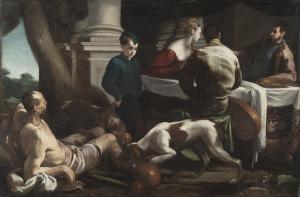
With the parable of the rich man and Lazarus, Jesus indicated that even if someone were to rise from the dead and warn others of what they might experience in death if they do not change their ways, many would not heed such warnings. They would find some reason to ignore or deny what they are being told. They might try to find excuses to justify themselves, explaining why the warning did not really apply to them, or they might suggest that the person never really was dead, and so not worthy to listen to. In the end, it is clear, because they do not want to believe what they are told, they will continue on as they were.
The story, of course, was not merely theoretical, for it is what happened with Jesus. The irony is that those who say they believe in him and follow him are often those who ignore what he said. This can be seen in the way they justify doing nothing for the poor. Jesus, throughout his ministry, made it clear that the poor, the outcast, those who society wanted nothing to do with, were among those whom God loves and wanted everyone else to love. Jesus also indicated, as a way to show such love, we should be concerned about justice, as it was injustice which made such people suffer. Thus, we have in Jesus, an example of what he meant that if someone were to come back from the dead, their message would not be heeded, for Jesus’ message was not heeded. Many self-proclaimed Christians don’t want to believe Jesus when he said that riches can hinder and weigh us down, that the wounds of the poor, the pain and suffering the poor experience thanks to the fact the rich neglect the common good, will come at a price, a price which cannot be paid off by money. Is that, not in fact, a point of the parable of the rich man and Lazarus?
There was a rich man, who was clothed in purple and fine linen and who feasted sumptuously every day. And at his gate lay a poor man named Lazarus, full of sores, who desired to be fed with what fell from the rich man’s table; moreover the dogs came and licked his sores. The poor man died and was carried by the angels to Abraham’s bosom. The rich man also died and was buried; and in Hades, being in torment, he lifted up his eyes, and saw Abraham far off and Lazarus in his bosom. (Lk. 16:19-23 RSV).
The rich man ignored Lazarus, and so Lazarus, who could have been helped by the rich man, indeed, whose life could have been saved if the rich man had cared for him, died. The rich man eventually died. It does not matter how much longer he lived, the point is that his riches, which might have been able to save Lazarus, was not enough to save him. When he died, the rich man, Dives, found himself having to experience the consequences of his actions, while he saw Lazarus was in Abraham’s bosom, being taken care of and shown the hospitality in death which he had not experienced in life.
The rich man was not entirely evil. He still had love for and care for his family, which is what motivated him to want to help his family and warn them of what will happen to them if they do not change their ways. But, unlike the implication suggested by Dickens in “A Christmas Carol,” the rich man was told it would change nothing if the living were visited by the dead:
But Abraham said, `They have Moses and the prophets; let them hear them.’ And he said, `No, father Abraham; but if some one goes to them from the dead, they will repent.’ He said to him, `If they do not hear Moses and the prophets, neither will they be convinced if some one should rise from the dead.’ (Lk. 16 29-31 RSV).
The rich man had to face the consequences of his actions; he had to deal with the pain and suffering he gave to others, including and especially Lazarus. The fact that he still had some concern for others suggests that, perhaps, the rich man was redeemable, even if the story almost suggests he was not, but that is because the story dealt with the consequence of death before Jesus’ conquest of death itself. Jesus’ death and resurrection changes the composition of the afterlife; the barriers which existed, the barriers which separated everyone from each other, and from heavenly glory, were broken down. This is where we can find hope for Dives, though he still would have to deal with the consequences of his actions, just as all of us will have to deal with our sins. What is important is that the reason he suffered was due to his lack of charity, that is, because he his greed got the best of him and so he ignored the dictates of justice. He should have understood he would be held responsible for not helping those he could with his money:
And he called out, `Father Abraham, have mercy upon me, and send Lazarus to dip the end of his finger in water and cool my tongue; for I am in anguish in this flame.’ But Abraham said, `Son, remember that you in your lifetime received your good things, and Lazarus in like manner evil things; but now he is comforted here, and you are in anguish. And besides all this, between us and you a great chasm has been fixed, in order that those who would pass from here to you may not be able, and none may cross from there to us.’ (Lk. 16:23-26 RSV).
While the story was told in such a way that it was implied that there is no bridge between the rich man and Lazarus, Jesus, we know, would eventually make that bridge, allowing all of us to be freed from the chains we made for ourselves due to our sins. Jesus, in his death, journeyed throughout all the realm of the dead, making sure everyone had the opportunity to follow after him and be saved, freed from the bondage of sin. While the consequences of our sin do not have to go on forever, thanks to the grace of the resurrection, we still have to deal with them and experience them, to some degree. Thus, we can still take the message of this story to light. Jesus would have us remember those around us, to take care of them, and warns us, if we do not do so, we will experience the effects of our uncharity for others coming back upon ourselves. And even though Jesus rose from the dead, confirming the validity of his message, how many ignore it and act as if it were nothing to ignore the poor and dispossessed? Let them heed Jesus. Jesus will not be fooled. If they think they can ignore the poor by appearing pious in public, they will find that their pretend piety will be rejected, and perhaps, add even more to the burden they will have to overcome. Whatever means of piety we use to ignore the expectations of love, though such piety might have some good involved with it, is not going to be enough. While we might want to look good in front of others, and indeed, many of the rich put on acts to do so, in end the end, it is not what is done in such a show which counts. This is why Paul emphasized that circumcision was not necessary for Gentile converts, because forcing them to be circumcised was all about them putting on a pious show, one which did them no good, as it led them to ignore the circumcision of the heart which they needed in order to properly love others:
It is those who want to make a good showing in the flesh that would compel you to be circumcised, and only in order that they may not be persecuted for the cross of Christ. For even those who receive circumcision do not themselves keep the law, but they desire to have you circumcised that they may glory in your flesh (Gal, 6:12-13 RSV).
Thus, Paul understood that many seek to be glorified in the little that they do, showing themselves off “in the flesh” as it were, in order to ignore what Jesus said he expected us to do. In reality, we should all take upon ourselves the cross of Christ and follow it, giving of ourselves, not out of show, but out of love. We should not glorify ourselves. We should not do acts of piety in front of others in order to be glorified. All such glory is a sham. The only true glory is in the cross of Christ, and the path of love which emerges from it. “But far be it from me to glory except in the cross of our Lord Jesus Christ, by which the world has been crucified to me, and I to the world” (Gal. 6:14 RSV). If we, therefore, claim to follow Jesus, let us truly heed what he said. He showed us love in action and the concerns love will have when it is confronted with injustices. So long as we try justify why that message does not apply to ourselves, we have not truly heeded Jesus, despite believing he came back from the dead.
Stay in touch! Like A Little Bit of Nothing on Facebook.
If you liked what you read, please consider sharing it with your friends and family!













